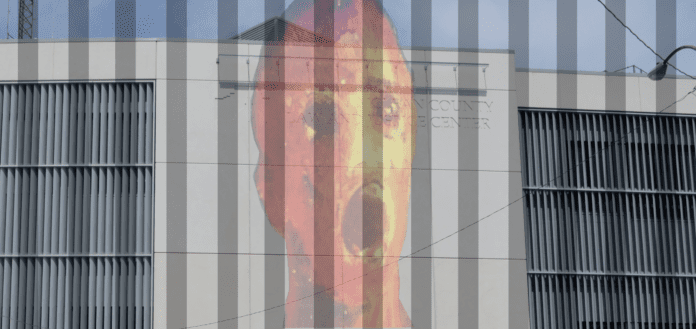Stats from the McLean County Jail, accurate as of the March 3rd:
Jail population: 244
Proportions by gender:
28 (11.5%) are female
216 (88.5%) are male
Proportions by race:
118 (48.4%) Black
9 (3.7%) Hispanic
116 (47.5%) Person of a Colonial Complexion
Number of people over 50: 16
Number of inmates sentenced: 30 (12.3%)
Number of inmates pretrial (felony): 204 (83.6%)
Number of inmates pretrial (property felony): 58 (23.8%)
Number of inmates pretrial (misdemeanors): 6 (2.5%)
Number of inmates pretrial for drug offenses: 79 (32.4%)
Number of out of county residences: 70 (28.7%)
The total number of inmates who have tested positive for COVID-19: 7
The total number of jail staff who have tested positive for COVID-19: 13
The current number of inmates positive for COVID-19: 0
The current number of jail staff positive for COVID-19: 1
McLean County Jail: Solitary Confinement & Vaccination Misinformation
The jail’s COVID mitigation strategy continues to be primarily solitary confinement. Inmates are isolated in their cells 23-hours a day. Sheriff Sandage said at the February McLean County Justice Committee meeting that jail inmates were scheduled for COVID vaccinations when the state enters Phase 1c. Illinois is currently in Phase 1b+. Sandage stated until inmates are vaccinated, they will remain under solitary confinement. At the March Justice Committee meeting, Sandage said there were no changes yet. However, the Illinois Department of Public Health states inmates at all corrections facilities–including county jails–are eligible for the vaccines in Phase 1b. McLean County has been in Phase 1b since January 18th.
Jail staff also qualify for COVID vaccines, but the jail does not seem to be keeping any record of staff vaccinations, according to record’s requests. All new entries into the jail are automatically placed in isolation for 14 days, so the primary entry point for the virus is staff members. Since reporting in early January of new COVID-19 cases hidden by the Sheriff, only two additional staff members have contracted the disease bringing the total number to 13.
The United Nation’s Guidance around imprisonment, called the Mandela Rules, prohibit solitary confinement longer than 15 days unless absolutely necessary. Since December 1st, McLean County Detention Center inmates have spent around 2,415 hours in isolation, a little more than 105 days. This isn’t including the several months of isolation inmates experienced last spring at the beginning of the pandemic. Solitary confinement is as distressing as physical torture.
McLean County typically has a pretrial detainee population of 90%, meaning they haven’t been convicted of any crime. While solitary confinement may be an effective mitigation strategy for preventing COVID-19 spread in jails, the long-term effects on the individuals will likely cost far more to society.
Due to the effect that isolation has on people, it can… lead to them becoming more violent and unpredictable. Such behavioral changes may increase the number or intensity of assaults on staff and other incarcerated people. They may also make it more likely that the person will engage in illegal behavior or experience isolation-related adjustment problems when they reenter society.
People who experience solitary confinement are more likely to develop anxiety, depression, suicidal thoughts, and psychosis. The practice also affects physical health, increasing a person’s risk for a range of conditions, including fractures, vision loss, and chronic pain.The U.S. uses solitary confinement more than some countries, with the practice disproportionately affecting Black and Hispanic people and those with mental health conditions. Solitary confinement faces strong criticism from organizations worldwide because of the harm that it causes.
Leonard, Jayne. “What are the effects of solitary confinement on health?” Medical News Today. August 6, 2020.
This article was originally published on Strangecornersofthought.com.





























